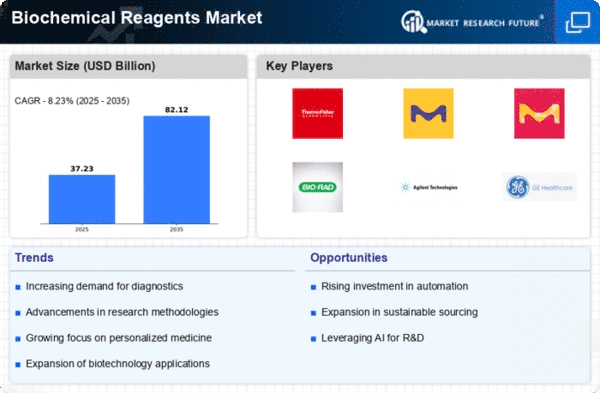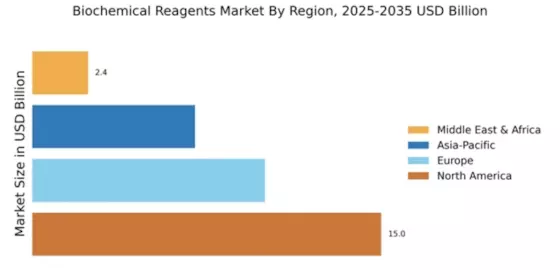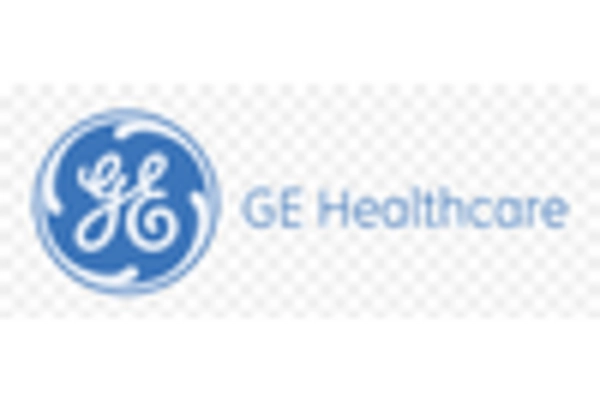Market Growth Projections
The Global Biochemical Reagents Market Industry is projected to experience robust growth, with estimates indicating a rise from 34.4 USD Billion in 2024 to 82.1 USD Billion by 2035. This growth trajectory reflects a compound annual growth rate (CAGR) of 8.23% from 2025 to 2035. Various factors, including technological advancements, increasing healthcare expenditure, and the rising prevalence of chronic diseases, are anticipated to drive this expansion. The market's dynamics suggest a favorable environment for stakeholders, including manufacturers, suppliers, and researchers, as they navigate the evolving landscape of biochemical reagents.
Emerging Markets and Globalization
Emerging markets present a substantial opportunity for the Global Biochemical Reagents Market Industry. As countries in Asia-Pacific, Latin America, and Africa experience economic growth, there is a rising demand for healthcare solutions, including biochemical reagents. Globalization facilitates the entry of international players into these markets, fostering competition and innovation. This trend is likely to enhance the availability of advanced reagents and promote local manufacturing capabilities. Consequently, the Global Biochemical Reagents Market Industry is expected to witness increased penetration in these regions, contributing to overall market growth.
Rising Demand for Diagnostic Testing
The Global Biochemical Reagents Market Industry experiences a notable surge in demand for diagnostic testing, driven by advancements in healthcare technologies and an increasing focus on early disease detection. The growing prevalence of chronic diseases necessitates the use of biochemical reagents in various diagnostic applications, including immunoassays and molecular diagnostics. This trend is expected to contribute significantly to the market's growth, with the industry projected to reach 34.4 USD Billion in 2024. As healthcare providers increasingly adopt innovative diagnostic solutions, the Global Biochemical Reagents Market Industry is poised for substantial expansion.
Expansion of Biopharmaceutical Sector
The expansion of the biopharmaceutical sector significantly impacts the Global Biochemical Reagents Market Industry. With the increasing number of biopharmaceutical products entering the market, there is a growing need for biochemical reagents in the development and manufacturing processes. These reagents are essential for various applications, including drug formulation, quality control, and stability testing. The biopharmaceutical industry is projected to continue its growth trajectory, further driving the demand for biochemical reagents. As the market evolves, the Global Biochemical Reagents Market Industry is likely to benefit from the increasing complexity and diversity of biopharmaceutical products.
Growing Research and Development Activities
The Global Biochemical Reagents Market Industry is significantly influenced by the increasing investment in research and development activities across various sectors, including pharmaceuticals and biotechnology. This trend is driven by the need for innovative solutions to address complex biological challenges. Research institutions and companies are actively seeking advanced biochemical reagents to facilitate their studies, leading to a heightened demand for high-quality reagents. The industry's growth is further supported by collaborations between academic institutions and private enterprises, fostering an environment conducive to innovation. As a result, the market is expected to expand, potentially reaching 82.1 USD Billion by 2035.
Technological Advancements in Reagent Development
Technological innovations play a pivotal role in shaping the Global Biochemical Reagents Market Industry. The introduction of novel reagents with enhanced specificity and sensitivity facilitates more accurate and efficient laboratory testing. For instance, advancements in microfluidics and nanotechnology are revolutionizing reagent formulation, leading to improved performance in various applications. These innovations not only enhance the reliability of test results but also streamline laboratory workflows. As a result, the market is expected to witness a robust growth trajectory, with a projected CAGR of 8.23% from 2025 to 2035, reflecting the industry's adaptability to evolving technological landscapes.

















